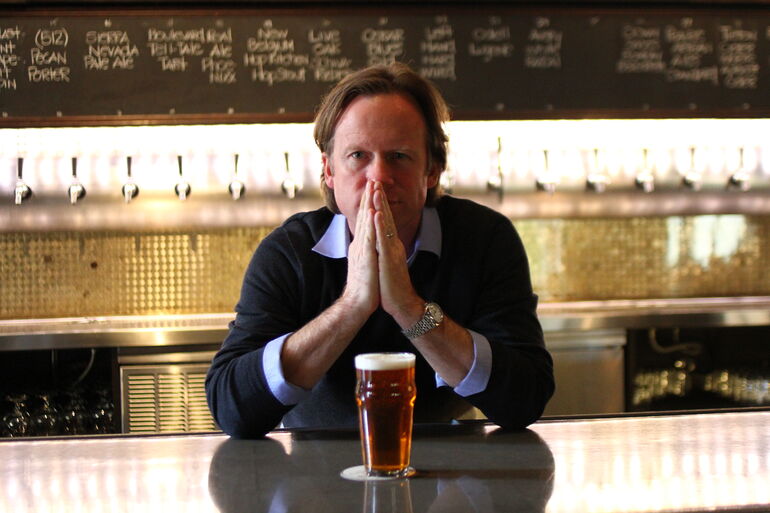Start 14-Day Trial Subscription
*No credit card required

Keith Schlabs of Flying Saucer
There are infinite points of entry into the beer business, but one you won’t see too often is “Beer Guru.” As a successful beer-focused restaurateur with more than twenty years of experience, Keith Schlabs has watched the metamorphosis of craft beer from a one-of-a-kind vantage point – interacting with brewers, distributors and the public at large – and gauging the ever-changing tides of taste. He spoke with The Beer Connoisseur about the state of the industry, and what it takes to be successful in life and beer.
“EXTRA-BEER-ESTRIAL”
Before co-founding the Flying Saucer Draught Emporium, The Meddlesome Moth and four other restaurant concepts, Schlabs was a young restaurant manager in Texas. The year was 1993, and the beer universe was still fighting its way out of the primordial booze.
“A friend told me about the first brewpub in Texas,” said Schlabs to BC in a recent interview. “It was called Yegua Creek Brewing Company. I went to check it out, met the owner, and we pretty much made a handshake deal right there and then that I would co-manage for him.”
At that point, Schlabs was relatively inexperienced when it came to beer.
“One of my favorite beers was Sierra Nevada at the time,” he said. “So I had at least a foundation, but I realized there was a lot to learn.”
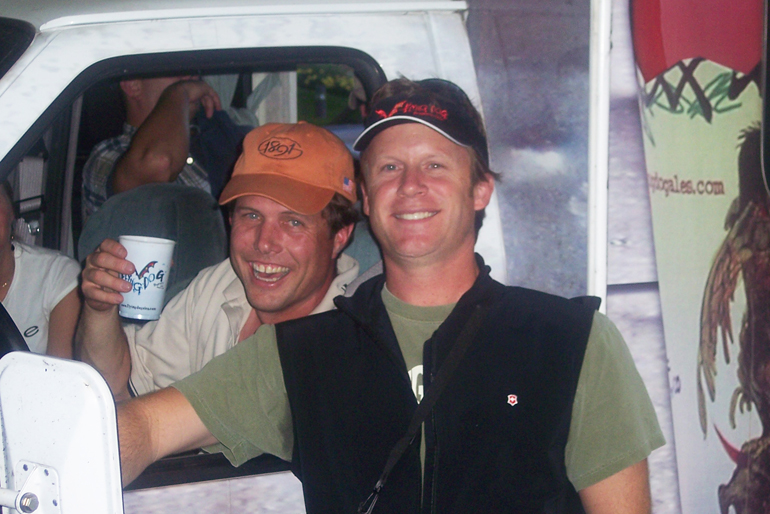
Schlabs, (pictured here with former Flying Dog CEO and current Karbach Brewing brewmaster Eric Warner) cites relationships as the cornerstone of the beer industry.
Sensing the value of a knowledgeable brewing team, Schlabs began to come in early to learn what really went in to making quality beer. It was a pivotal moment marking the beginning of a lifelong education, and Schlabs had chosen a great place to begin. Yegua Creek was ahead of its time.
“It was interesting to learn about the beer culture and how people wanted to talk about beer and share their passion,” he said. “We had a pils, a wheat, a pale ale, a brown ale, an IPA, a stout, and the occasional curveball, like a Habanero IPA. That was 1993. What those brewers taught me is that you need diversity, and I think their attention to detail and quality made me realize you’ve got to do things right.”
Schlabs continued his working education, and the idea of a beer-centric restaurant began to take hold.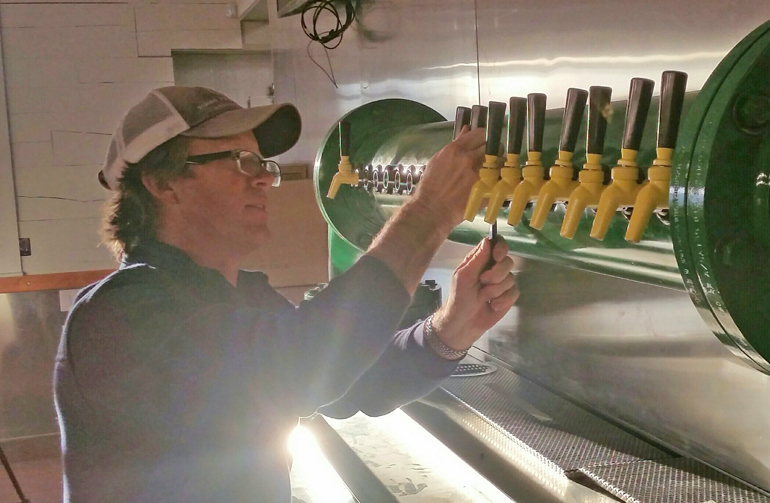
"It’s exciting to be in an industry where there’s always something to learn," said Schlabs, pictured here installing taps at the recently opened Mud Hen Meat and Greens.
“We were so busy in a part of Dallas that was hard to get to that I knew there was an attraction to beer,” said Schlabs. “They harvested a lot of excitement for beer in Texas.”
Yegua Creek would close a few years later, but not before taking home Great American Beer Fest Gold in 1996 for its Scotch Ale.
A WYNNE-WIN SCENARIO
Sensing the impending boom, Schlabs began scoping out locations for a possible brewpub concept. While visiting the location of what would become the first of 16 Flying Saucer restaurants, he went across the street for lunch and happened to meet Shannon Wynne, the owner of the establishment. Wynne had his eye on the same building, and realizing they had similar interests, the two began hashing out what would become Flying Saucer. With an emphasis on quality and choice, their philosophy mirrored the craft beer movement.
“Early on we had to educate ourselves – then our customers – on what beer should taste like, smell like, and how it should be presented,” Schlabs said. “We wanted breweries to count on us to serve their beer the way they want it to be served ... I think we were able to make people smarter so when they went out into the marketplace they made good decisions.”
Schlabs would be Flying Saucer’s Beer Director and keep a close eye on the 60-plus taps because Wynne doesn't drink. This required a constant finger on the beer pulse and the ability to simultaneously maintain relationships with brewers, distributors and the general public.
Initially, keeping the tap wall stocked meant relying on imports; there simply wasn’t enough local craft beer to go around. In 1995, there were around 600 small brewers, many of which had neither the quality, quantity nor ability to distribute. Now, with more American craft brewers than ever before, importers are experiencing a downturn, forcing Schlabs to make some tough decisions in accordance with the times.
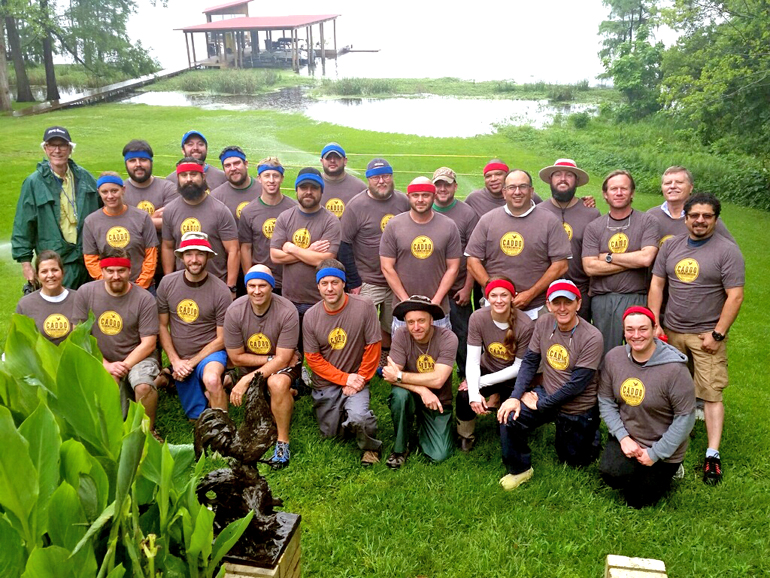
Flying Saucer just celebrated its 20th anniversary, and he’s worked and learned with many of his employees for well over a decade. He can’t do it alone.
“I have relationships with a lot of suppliers, importers like BELUKUS, Manneken-Brussel Imports, Merchant Du Vin & B. United,” he said. “I love these guys and they’re picking up beers that are interesting, well-made and have a vast, colorful history and I respect that. There will always be a place for Samuel Smith, Orval or Chimay. Young’s has been a big beer for us for a long time. Things change and we must stay on top of our game. People want new beers. So I’ve got to balance protecting people that brought us to the dance, because I won’t forget that. When we needed help with good beer, a lot of these older breweries from across the pond stepped up.”
Although the U.S. market represented a small portion of their sales, the breweries were excited to see their beers enjoyed in the US. Now, imports still play an important role in any well-appointed beer joint, but the market focus has shifted toward American beer.
“In the first decade, importers were tremendous supporters [of Flying Saucer]. But now, more national and local brewers are so talented … It’s right there, and it feels good to spend money with these people that need us, and to showcase their beers to an audience that wants to learn more about them.”
Schlabs stresses relationships as one of the cornerstones of the beer industry. In order for business to thrive, he must be collaborative and forward-thinking without forgetting the past.
LOOKING OUT FOR BUDS
With 25 beer-focused restaurants under his belt and more in the pipeline, Schlabs pinpoints developing relationships with knowledgeable personnel as a key to success in the beer industry. Flying Saucer just celebrated its 20th anniversary, and he’s worked and learned with many of his employees for well over a decade. He can’t do it alone.
“It’s pretty important that you vet out a good beer director,” he says. “You have to be very careful when you’re running a beer joint; that you’re buying it right, you’re checking your collars and looking at bottle dates, aging beers that should be aged, serving them properly, keeping glassware clean … All of that is important. The liquid today is not cheap. I had a distributor tell me the day of the $1000 dollar keg is near, and I believe it.”
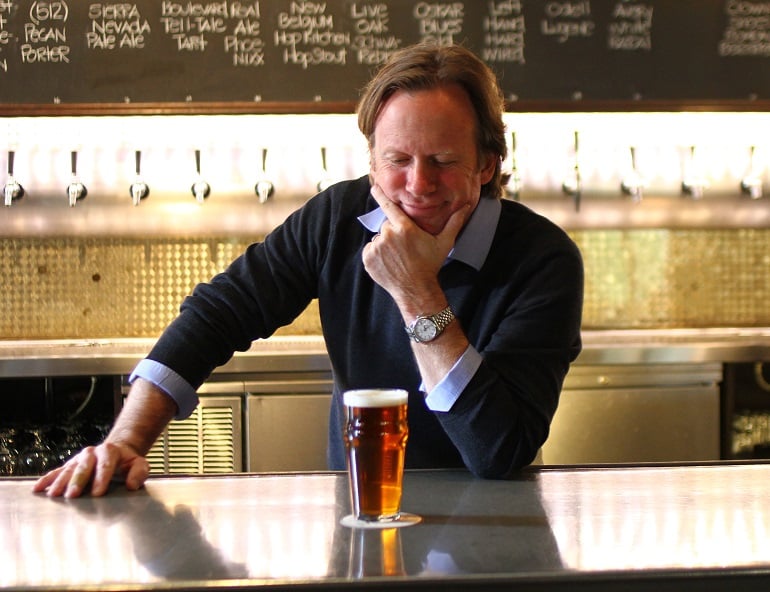
The rise in price of beers means every keg is an investment, which means trusting beer directors to maintain a well-rounded portfolio.
“I’ve gotta be careful that we don’t lean too far into IPA-land, but for the most part, I trust the team,” he said.
The element of trust is paramount in the beer industry, and this past year’s flurry of acquisitions have many people questioning the motives of buyers. Though Schlabs is a proponent of “small beer” and does not sell Budweiser at Flying Saucer or Meddlesome Moth, he doesn’t condemn those who have sold to macro-brewers.
“I have relationships that go 20-plus years in this business, and they mean a lot,” he says. “They’re brothers within the culture. I can’t lay judgment on someone who’s busted their ass for 25 years to build a brand and expand, if they sell. I like knowing that their families won’t have to work their asses off for the rest of their lives.”
Essentially, as long as the purchased breweries maintain their quality and take care of their employees, Schlabs won’t abandon them.
“There are people that we've bonded with, throughout our journey, and I think we have an obligation to take care of those people.”
Schlabs points to Breckenridge Brewery, which he has worked with for decades.
“They’re going to take care of their people,” he says. That’s who they are. If my 471 [IPA] continues to taste as good as it does now, I don’t have a problem with it.”
Schlabs with good friend and Breckenridge President Todd Usry. " I can’t lay judgment on someone who’s busted their ass for 25 years to build a brand and expand, if they sell."
When it comes to big beer, Schlabs acknowledges it has a place, but doesn’t feel beholden to it.
“I’ve had fears that big conglomerates are going to buy up breweries and shelf space,” he says. “If that means I can get a Lagunitas at the airport or the stadium, which I couldn’t before, that would help … But no one can influence what we do.”
He also points out that former Budweiser employees have gone on to found or brew at craft breweries.
“I try to wean people from it but I certainly respect [macro-brewers’] knowledge and abilities,” Schlabs said.
THE BUBBLE
Another oft-discussed topic is the craft beer “bubble,” and its impending burst. How can craft beer sustain such a high rate of interest, market share and brewery openings? Schlabs offers a simple opinion: “Customers aren’t going to go backwards with their taste buds, no more than those who find real food will go back to fast food.”
The statement seems obvious, but the implications are myriad, and deeper than might be expected. Everyone remembers their “gateway beer.” For the craft beer drinker, it’s akin to a baptism. Though Schlabs remains modest (he was content after opening one restaurant, calling Wynne “the visionary” of the group), the restaurants he has helped create played an integral part in bringing quality beer from around the country to the Bible Belt.
Areas like Memphis or Raleigh simply didn’t have access to better beer until Flying Saucer helped open the pipeline by negotiating a more diverse portfolio through distributor connections.
“When we started looking at the landscape,” said Schlabs, “some of the most exciting beers were Guinness and Newcastle. Mostly imports. We found a distributor in Tennessee that believed in what we were doing and wanted to help. They picked up 40 different beers to sell on draft. They worked with other craft beer distributors in Texas that we knew to determine which [beers] were good fits.”
As the beer rolled in, people came alive.
“We brought a small San Antonio brewer, Yellow Rose Brewing Company to Memphis, and would sell their Bubba Dog wheat beer, and everybody would yell ‘Bubba Dog’ when we poured one. It was the craziest thing. Here’s this sleepy downtown, people are coming out of the offices, even driving downtown to come down to the Flying Saucer and have good beer. So I think it may have awakened people in a sense. They got excited, we would have beer events and they would pack it in. I think we proved to ourselves we could get outside of our comfort zone, and that we could bring beer to a city that was thirsty.”
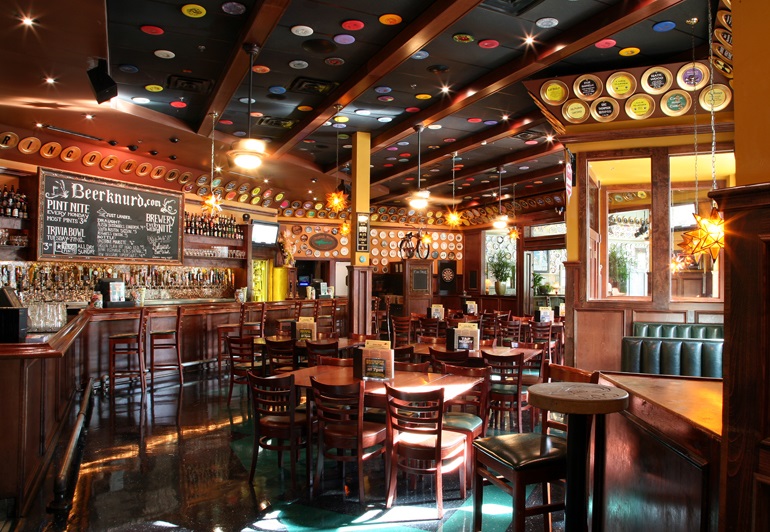
Some areas simply didn’t have access to better beer until Flying Saucer helped open the pipeline.
In some cases, Schlabs was even able to call on Flying Saucer’s UFO Club, a group of beer enthusiasts now over 150,000 strong, to successfully petition against prohibitive beer legislation.
“There was a guy who now owns Fullsteam Brewery in Durham, Sean Wilson,” said Schlabs. “People may not give him enough credit. He was part of the Pop The Cap campaign, (combatting the state’s 6% ABV cap) Sean initialized this Pop The Cap campaign in North Carolina, and we united the Beerknurds and helped support that legislation.”
It worked, and then they went to South Carolina and did it again. Schlabs no longer had to smuggle Chimay Grand Reserve into a beer dinner just to give beer drinkers a taste of the good stuff. With quality local beer at their fingertips, drinking American never tasted sweeter.
The thrill of a new sensory experience is integral to craft beer, and something that macro-brews will never be able to wholly replicate, but what Schlabs seems to love most about the industry is the people it attracts.
“Beer lends itself to camaraderie and community,” he says. “There are so many good people involved, and I hope that we keep doing our part. Presenting beers the way the brewers intended; giving folks a place to talk about a new beer or style. It’s exciting to be in an industry where there’s always something to learn. What’s important to me is that we’ve made a lot of relationships along the way. I met my best friends in the beer business, I met my wife in the beer business … These are lifelong relationships, and I think beer brought us together. It’s been a blessing.”
As for the future of the industry, Schlabs predicts craft brewing’s meteoric rise will taper, but not implode. Either way, he’ll be there for his buds in the biz.
“We are at a peak,” he says. “We’re enjoying what we all wanted to happen – widely available fantastic beer, anywhere. There will be some fallout, but we should all work hard to protect those who deserve it.”
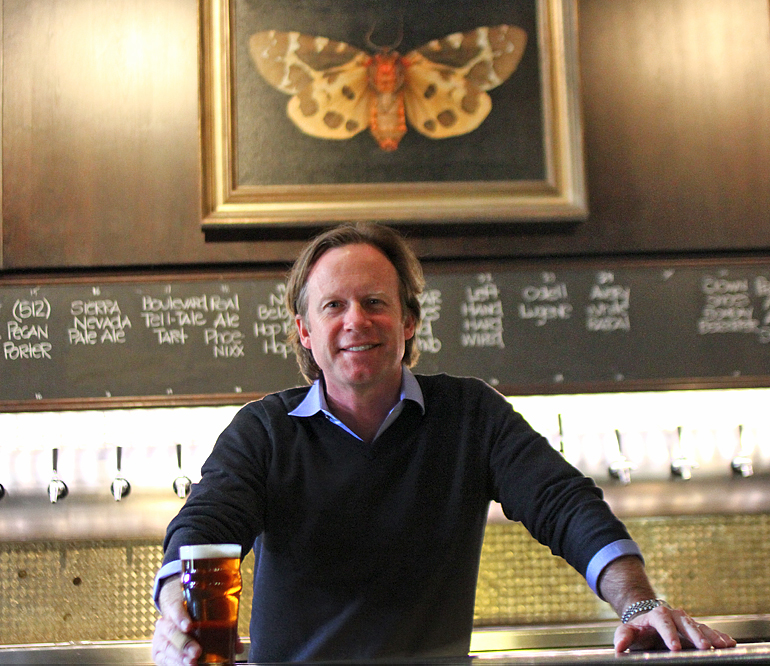
Photos Courtesy of Flying Saucer



